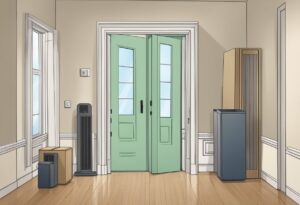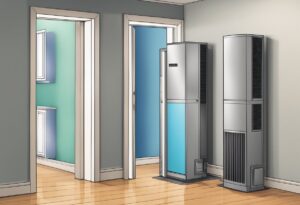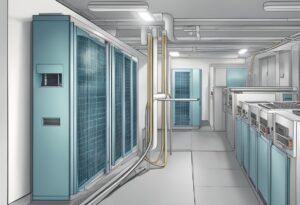Closing doors to unused rooms has long been touted as a simple and effective way to improve HVAC efficiency. The idea is that by closing off rooms that are not in use, the air conditioning or heating system will not have to work as hard to maintain a comfortable temperature in the rest of the house. However, recent studies have shown that this may not actually be the case.

One of the main reasons why closing doors to unused rooms doesn’t improve HVAC efficiency is due to the way that modern HVAC systems are designed. Most systems are designed to maintain a consistent temperature throughout the entire house, regardless of how many rooms are in use. This means that if you close off a room, the HVAC system will still have to work just as hard to maintain the temperature in the rest of the house. In fact, closing off a room may actually cause the HVAC system to work harder, as it will have to compensate for the reduced airflow.
Another reason why closing doors to unused rooms may not be effective is that it can actually create a negative pressure in the house. When doors are closed, air is prevented from flowing freely throughout the house. This can cause a buildup of pressure in the rooms that are still in use, which can lead to a number of problems, including drafts, poor indoor air quality, and even mold growth. Overall, while it may seem like closing doors to unused rooms is a simple and effective way to improve HVAC efficiency, the reality is that it may not be the best solution for most homeowners.
The Basics of HVAC System Operation

Airflow Dynamics
The HVAC system is responsible for maintaining a comfortable temperature in a building, and it does this by regulating the flow of air. The system takes in air from the outside, filters it, and then circulates it throughout the building. The air is heated or cooled as needed, depending on the temperature set on the thermostat.
The airflow dynamics of an HVAC system are crucial to its efficiency. If the airflow is restricted in any way, it can cause the system to work harder than necessary, which can lead to higher energy bills. It’s important to make sure that the air filters are clean and that there are no obstructions in the ductwork.
Thermostat Regulation
The thermostat is the control center of the HVAC system. It is responsible for regulating the temperature in the building by turning the heating or cooling on and off as needed. The thermostat works by sensing the temperature in the room and comparing it to the temperature set on the thermostat.
To improve the efficiency of the HVAC system, it’s important to set the thermostat to a comfortable temperature and leave it alone. Constantly adjusting the temperature can cause the system to work harder than necessary, which can lead to higher energy bills. It’s also important to make sure that the thermostat is located in an area that accurately reflects the temperature of the room, away from any sources of heat or cold.
Common Myths About HVAC Efficiency

Myth: Closed Doors Concentrate Cooling
One common myth about HVAC efficiency is that closing doors to unused rooms concentrates cooling in the rooms that are being used, making those rooms cooler and more comfortable. However, this is not true. Closing doors to unused rooms can actually disrupt the airflow in the house, causing the HVAC system to work harder and less efficiently.
When doors are closed, the air that is being cooled by the HVAC system has nowhere to go, leading to an increase in pressure in the ductwork. This can cause leaks and other issues that can reduce the efficiency of the HVAC system. Additionally, closed doors can cause temperature imbalances in the house, making some rooms too hot and others too cold.
Myth: Closed Doors Reduce Energy Consumption
Another common myth is that closing doors to unused rooms reduces energy consumption by preventing the HVAC system from cooling those rooms. However, this is also not true. Closing doors can actually increase energy consumption by causing the HVAC system to work harder and less efficiently.
When doors are closed, the HVAC system has to work harder to push air through the ductwork and into the rooms that are being used. This can lead to increased energy consumption and higher utility bills. Additionally, closed doors can cause the HVAC system to cycle on and off more frequently, which can also increase energy consumption.
Overall, it is important to understand that closing doors to unused rooms does not improve HVAC efficiency. In fact, it can actually have the opposite effect, leading to increased energy consumption and reduced efficiency. Instead, homeowners should focus on other ways to improve HVAC efficiency, such as proper maintenance, air sealing, and insulation.
The Impact of Closed Doors on HVAC
Pressure Imbalance
Closing doors to unused rooms can result in pressure imbalances in the house. When a door is closed, the air in that room is prevented from flowing freely into the rest of the house. This can create a positive pressure in the room, which can cause air to leak out of the room through any gaps or cracks in the walls, ceiling, or floor.
This positive pressure can also cause negative pressure in other parts of the house. Negative pressure can cause air to be drawn in from the outside, which can lead to drafts and energy loss. Additionally, negative pressure can cause exhaust gases from combustion appliances, such as furnaces and water heaters, to be drawn back into the house, which can be a health hazard.
Duct Leakage and Energy Loss
Closed doors can also cause duct leakage and energy loss. When a door is closed, the air in the room is prevented from flowing freely into the rest of the house. This can cause the air pressure in the ducts to increase, which can result in leaks in the ducts. Leaks in the ducts can cause heated or cooled air to escape into unconditioned spaces, such as attics or crawl spaces, which can result in energy loss.
Furthermore, closed doors can cause the HVAC system to work harder than it needs to. The HVAC system is designed to maintain a certain level of air flow throughout the house. When a door is closed, the air flow is restricted, which can cause the system to work harder to maintain the desired level of air flow. This can result in increased energy consumption and higher utility bills.
In conclusion, closing doors to unused rooms does not improve HVAC efficiency. It can actually lead to pressure imbalances, duct leakage, energy loss, and increased energy consumption. It is recommended to keep all doors open to maintain proper air flow and ensure the HVAC system operates efficiently.
Strategies for Improving HVAC Efficiency
Proper Insulation and Sealing
One of the most effective ways to improve HVAC efficiency is to ensure that the home is properly insulated and sealed. This helps to prevent heat from escaping in the winter and entering in the summer, reducing the load on the HVAC system. Homeowners can consider adding insulation to attics, walls, and floors, as well as sealing air leaks around doors, windows, and ducts.
Regular HVAC Maintenance
Regular maintenance of the HVAC system can help to improve its efficiency and extend its lifespan. This includes tasks such as changing air filters, cleaning coils, and checking refrigerant levels. Homeowners should schedule annual maintenance with a licensed HVAC technician to ensure that their system is running at peak efficiency.
Smart Thermostat Use
Smart thermostats can help to improve HVAC efficiency by automatically adjusting the temperature based on the homeowner’s schedule and preferences. They can also provide energy usage data and allow for remote control of the system. Homeowners should consider investing in a smart thermostat to optimize their HVAC system’s performance.
By implementing these strategies, homeowners can improve the efficiency of their HVAC system and reduce energy costs. Proper insulation and sealing, regular maintenance, and smart thermostat use can all help to optimize the system’s performance and reduce its workload.
Alternative Methods to Zone Cooling
Zoned HVAC Systems
One alternative method to zone cooling is to install a zoned HVAC system. A zoned HVAC system is designed to provide heating and cooling to specific areas or zones within a building. This system uses dampers in the ductwork to control the flow of air to each zone. Each zone has its own thermostat, which allows for individual temperature control.
Zoned HVAC systems are more energy-efficient than traditional HVAC systems because they only heat or cool the areas that need it. This means that the system doesn’t waste energy by heating or cooling unused rooms. In addition, zoned HVAC systems can help reduce wear and tear on the system, which can extend its lifespan.
Supplemental Cooling Units
Another alternative method to zone cooling is to use supplemental cooling units. These units are portable air conditioners that can be placed in specific rooms or zones to provide additional cooling. Supplemental cooling units are ideal for homes or buildings that have areas that are difficult to cool, such as rooms with large windows or rooms that are located on the top floor.
Supplemental cooling units are energy-efficient because they only cool the areas that need it. In addition, they can be turned off when not in use, which helps save energy. However, it’s important to note that supplemental cooling units can be noisy and may not be as effective as a zoned HVAC system.
Overall, there are alternative methods to zone cooling that can help improve HVAC efficiency. Zoned HVAC systems and supplemental cooling units are both effective ways to provide heating and cooling to specific areas or zones within a building.

0 Comments